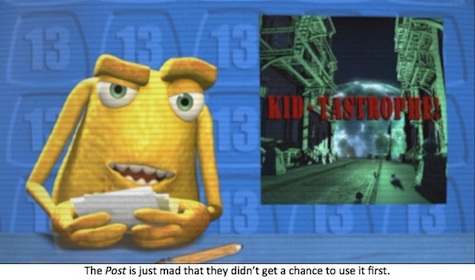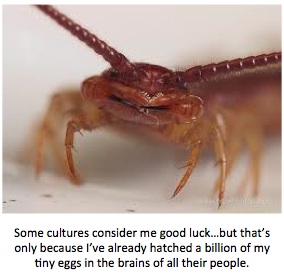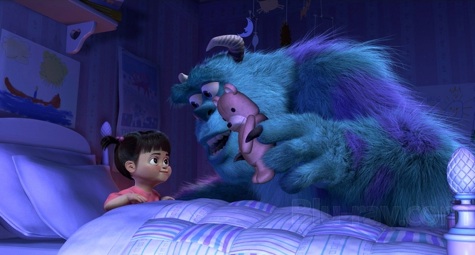Like the best kids’ books, the best kids’ movies work on multiple levels, and Monsters, Inc., Pixar’s fourth feature-length film, is no exception.
To recap Monsters, Inc. (and if I must say it—arrrgh, thar be spoilers ahead): Monsters James P. (Sulley) Sullivan and Mike Wazowski are best friends (and coworkers) who, along with a myriad of other monsters, live and work in the bustling city of Monstropolis. Denizens of Monstropolis are facing an energy crisis. Their main source of power, called Scream, is sourced from the terrified screams of the numerous children that monsters like Mike and Sulley scare for a living at Monsters, Incorporated. But with the increasingly terrifying state of the world, kids have bigger fears on their mind, and the monsters in their closets just aren’t as scary as they used to be. Fewer scares = fewer screams = energy shortage.
Released in late 2001, Monsters Inc. was completed before the events of September 11th unfolded. The film certainly wasn’t designed to be a response to those events. Yet the overarching confront-your-fears messaging was spot-on for those raw first few months that buzzed with color-coded emergency warnings and media-fueled anxiety. So it was comforting, for both kids and adults alike, to watch Monsters’ camped-up CDA (Child Detection Agency) SWAT teams overreact to a child’s tiny sock, or see the news anchors panicking on air while a graphic bearing a NY Post-esque “KID-TASTROPHE” headline looms behind them.

But more than a decade later, removed from that shadow, Monsters, Inc. still shines. There’s no denying that the film is geared toward kids—a wonderfully imagined world, inhabited by a colorful cast of barely-scary-even-when-they-are-trying monsters, where silly sight gags abound. But take a closer look and you’ll see that the underlying messages in Monsters, Inc. aren’t just for kids, they apply pretty damn well to those of us in the post-(post-post-post-) kindergarten set as well.
It’s no accident, it relies on clever writing, something the folks at Pixar seem to value. So much of the comedy in Monsters depends on wry observations about corporate America, that—although kids might get some of the jokes in theory (what is homework, if not a TPS report with training wheels)—it’s clear that the real targets are the adults: Isn’t there always at least one Roz or Randall (who incidentally bears a striking resemblance to the monster of my nightmares, the house centipede) at every job? Aren’t meaningless performance evaluations and dreaded paperwork de rigueur in most offices?

Naturally, the strongest message in Monsters, Inc. is that of confronting one’s fears—whether they be literal (the monsters in your closet) or figurative (the “monsters” in your workplace). While Boo’s triumph over the ever-plotting Randall is relatively quick and clear-cut; Sulley’s victories are much more nuanced. He and Mike risk everything to expose the conspiracy that goes straight to the top of Monsters, Inc. But by taking on the bad guys, they also shut down the company, leaving lots of jobless monsters and threatening all of Monstropolis’s power supply. Sticking up for yourself is tough enough when you’re a kid, tougher still when you’re an adult and you have a myriad of additional responsibilities to consider. But in Monsters, Inc. the message is clear: even though it was scary, the most important thing was that Boo, Sulley and Mike took that stand at all.
Monsters, Inc. is also about—to paraphrase the old Apple ads—thinking differently. At the start of the film, Sulley’s purely a company man, whose goals and mind-set are exactly in-line with those of Monsters, Inc. But through his interactions with Boo, Sulley begins to see the world differently. This change in world-view allows him to tackle the problem of the Monstropolis energy crises, and by the end of the film, Sulley literally turns Monsters, Inc. into a laugh factory. While this probably won’t happen where you work, it’s a great message (for young and old) about how true innovation occurs when people approach old problems from a new angle.
So whether you are watching Monsters, Inc. for the first time or the thousandth, whether you are watching for the slapstick comedy or the hidden humor, try to keep these things in mind: confront the fears that hold you back, try to think outside the box, and okay, fine—wear sunscreen.
When Nancy Lambert doesn’t have her nose buried in a book, she’s busy cutting down restless draugrs in Skyrim and putzing around online. She knows the Baz thing dates her.










